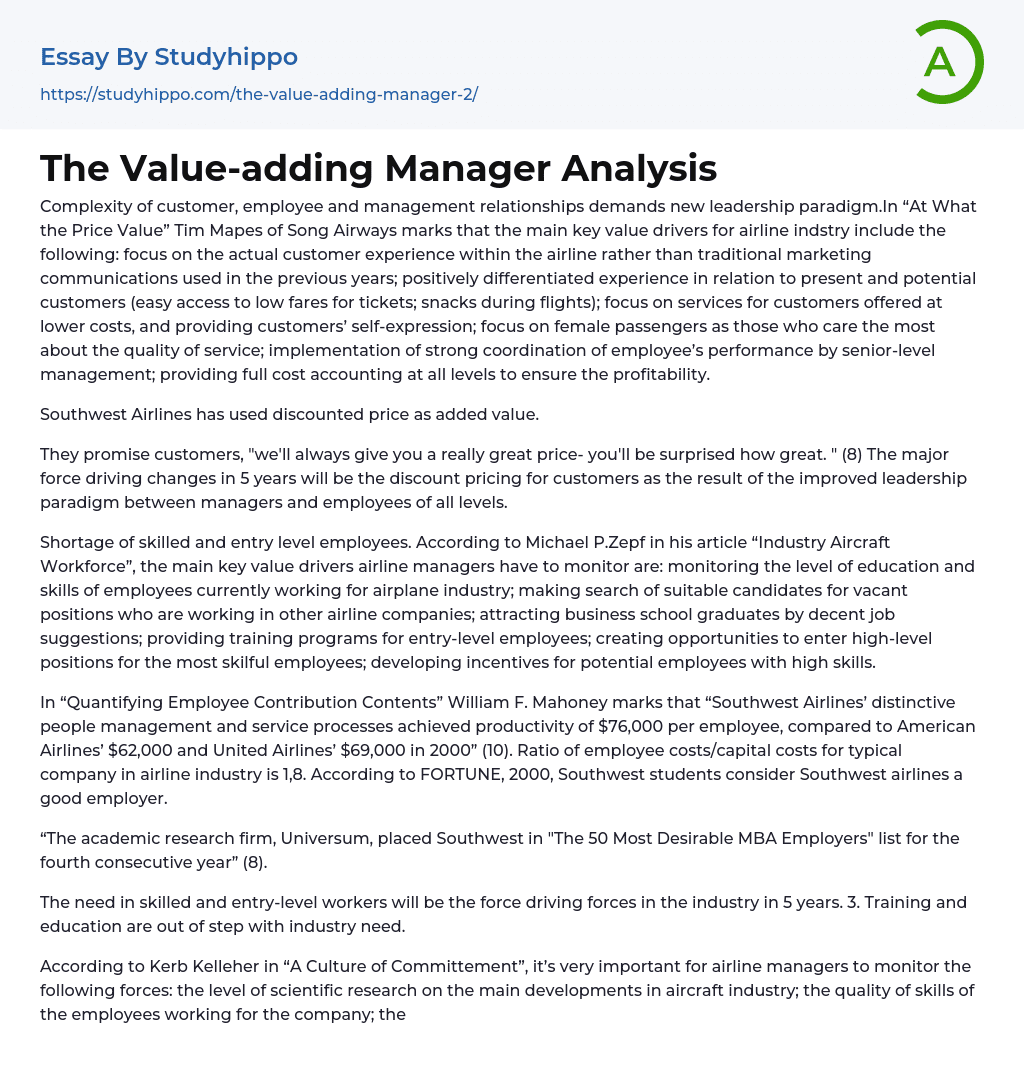The complexity of customer, employee, and management relationships demands a new leadership model. "At What the Price Value" by Tim Mapes of Song Airways identifies key drivers of value for the airline industry. These include prioritizing the actual customer experience, moving away from traditional marketing methods, providing a positive and unique experience through easy-to-find low fares and in-flight snacks, offering lower-cost services that allow for customer self-expression, focusing on female passengers who place a high value on service quality, implementing strong coordination among employees at all levels under senior management supervision, and ensuring profitability by providing full cost accounting at all levels.
Discounted price has been utilized by Southwest Airlines as an additional benefit.
In the airplane industry, both skilled and entry level employees are in short supply. Michael P. Zepf suggests that airlin
...e managers should prioritize various value drivers such as monitoring existing employee education and skills, seeking suitable candidates from other airlines to fill open positions, attracting business school graduates with enticing job offers, providing training programs for entry-level workers, facilitating opportunities for experienced employees to advance to higher positions, and incentivizing potential high-skilled hires.
William F. Mahoney states in his article "Quantifying Employee Contribution Contents" that in 2000, Southwest Airlines attained a productivity rate of $76,000 per employee. This was notably higher than American Airlines' $62,000 and United Airlines' $69,000 rates. Typically, the employee costs to capital costs ratio for an airline company is 1.8.According to FORTUNE's 2000 report, Southwest Airlines students consider the company to be a great employer.
In the next five years, the industry will be mainly influenced by the need for
skilled and entry-level workers, but the existing training and education systems do not match these requirements.
The demand for highly skilled employees and top-quality aircraft will be the primary factor fueling changes in the airline industry over the next five years.
According to the executive summary on Aviation Security (www.piperrrudnic.com), Southwest managers need to take into account a number of employee security factors. These include complying with new security legislation for employee coordination, monitoring potential cost increases as a result of new security issues, and placing greater emphasis on the safety of airplane passengers and cargo. Due to the events of September 11th, these security concerns are expected to affect airline operations over the next five years.
Workplace violence. According to Barbara M.
In their article titled "Cameraphones: Innocuous Gadgets Or Workplace Threats", Ross and Lauren G. Krasnow highlight key values that Southwest managers need to consider. These include prohibiting the use of cameras for recording in the workplace, requiring employees to obtain permission before taking pictures or videos, maintaining customer confidentiality, and implementing measures to prevent terrorist attacks in the workplace. The text is presented in a justified style.
Kerb Kelleher advocates for the management of the airline industry to focus equally on analyzing the needs of both employees and customers. This includes providing additional benefits based on employee performance and frequent first-class flyers, preventing strikes through job satisfaction, and ensuring maximum customer satisfaction to avoid losing customers. This is outlined in Kelleher's "A Culture of Commitment" publication.
Southwest currently has a unionization rate of 80%. Over the next five years, changes will be driven by the challenge of maintaining
high levels of employee and customer satisfaction. Janet Kraus's research highlights the importance of loyal employees in creating loyal customers, with compensation and job growth being key factors.
The airline industry will experience growth in the years to come as employees strive for career advancement and seek ownership within their companies.
Southwest Airlines was awarded as "The Most Pleasant" airline in 2003, receiving 27% of the votes. However, it later lost its title. According to Kerb Kelleher's book "A Culture of Commitment," the company chose not to pay competitors millions per year for their reservation systems and instead created their own electronic ticketless system. This allowed Southwest to eliminate the need for travel agents to manually write tickets and avoid being controlled by competitors' distribution systems. Moving forward, prioritizing customer needs and taking full responsibility will drive change.
- Academia essays
- Higher Education essays
- Language Learning essays
- Studying Business essays
- Education System essays
- Study essays
- First Day of School essays
- Scholarship essays
- Pedagogy essays
- Curriculum essays
- Coursework essays
- Studying Abroad essays
- Philosophy of Education essays
- Purpose of Education essays
- Brainstorming essays
- Educational Goals essays
- Importance Of College Education essays
- Brown V Board of Education essays
- The Importance Of Higher Education essays
- Online Education Vs Traditional Education essays
- Academic And Career Goals essays
- Academic Integrity essays
- Brown Vs Board Of Education essays
- Distance learning essays
- Technology in Education essays
- Vocabulary essays
- Writing Experience essays
- Importance of Education essays
- Early Childhood Education essays
- Academic Degree essays
- Academic Dishonesty essays
- School Uniform essays
- Academic writing essays
- Cheating essays
- Bachelor's Degree essays
- MBA essays
- College Life essays
- Grade essays
- Diploma essays
- Phonology essays
- Sentence essays
- Filipino Language essays
- Pragmatics essays
- Millennium Development Goals essays
- History Of Education essays
- Graduate School essays
- Middle School essays
- School essays
- Special Education essays
- University essays




